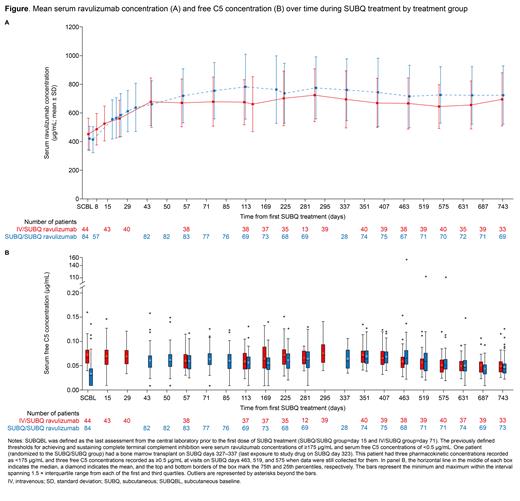Background : Subcutaneous (SUBQ) ravulizumab, administered weekly via an on-body delivery system, showed pharmacokinetic (PK) non-inferiority to intravenous (IV) ravulizumab over 71 days in adult patients with paroxysmal nocturnal hemoglobinuria (PNH) who were clinically stable on prior IV eculizumab treatment (NCT03748823). This analysis reports results through 2 years of SUBQ ravulizumab treatment during the extension period of a phase 3 randomized trial. The reporting period started at day 15 for patients who continued SUBQ ravulizumab during the extension period (SUBQ/SUBQ) and day 71 for patients who switched from IV ravulizumab to SUBQ ravulizumab (IV/SUBQ).
Objectives: To evaluate the PK, pharmacodynamics (PD), efficacy, and safety of SUBQ ravulizumab through 2 years (day 743) of treatment in adult patients with PNH previously treated with IV eculizumab.
Methods: Patients (≥ 18 years) who received IV eculizumab (once every 2 weeks) for at least 3 months prior to study entry with clinically stable PNH (lactate dehydrogenase [LDH] levels ≤ 1.5 × upper limit of normal [246 U/L]) were enrolled in the study, which consisted of a screening period (day −1 to day −30), a 10-week randomized treatment period, and an extension period of up to 172 weeks. During the randomized treatment period, patients were assigned (2:1) to receive either SUBQ ravulizumab (weekly) or IV ravulizumab (once every 8 weeks); all patients received SUBQ ravulizumab during the extension period. PK/PD endpoints through 2 years of treatment included serum ravulizumab and free C5 concentrations. Efficacy endpoints included change in LDH from baseline, incidence of breakthrough intravascular hemolysis (BTH), maintenance of transfusion avoidance, and maintenance of stabilized hemoglobin (avoidance of a ≥ 2 g/dL decrease in hemoglobin in the absence of transfusion). Fatigue was assessed using the Functional Assessment of Chronic Illness Therapy (FACIT)-Fatigue subscale questionnaire. Safety outcomes, including adverse events (AEs), serious AEs (SAEs), and adverse device effects (ADEs), were also assessed up to the 2-year data cut-off.
Results: In total, 128 patients received SUBQ ravulizumab (SUBQ/SUBQ: n = 84; IV/SUBQ: n = 44; mean [range] duration of SUBQ treatment: 839.4 [37 - 1108] days). During 2 years of SUBQ treatment, serum ravulizumab concentrations were maintained ≥ 175 μg/mL and serum free C5 concentrations < 0.5 μg/mL, the previously defined thresholds for achieving and sustaining complete terminal complement inhibition ( Figure). Efficacy endpoints remained consistent over time. Mean (standard deviation [SD]) percentage change in LDH from baseline to day 743 was +2.3% (21.6%; n = 108). BTH events were infrequent: 5/128 patients (3.9%). Transfusion avoidance was maintained in 74.2% of patients (n = 95/128) and 69.1% (n = 85/123) achieved stabilized hemoglobin. Mean (SD) change in FACIT-Fatigue subscale score from baseline to day 743 was +1.3 (9.09; n = 68). The most common AEs (excluding ADEs related to device product issues) during SUBQ treatment were COVID-19 (25.0%), headache (18.8%), and pyrexia (18.0%). Treatment-emergent SAEs were experienced by 29.7% of patients. No treatment-emergent anti-drug antibodies were observed. ADEs not related to a medical device issue were reported by 25.0% of patients. The most frequently reported ADEs unrelated to a medical device issue were injection site reaction (4.7%), medical device site erythema (4.7%), and injection site erythema (3.1%). Among 30,221 devices used in the study, full volume per device was delivered by 98.6% of devices. Complaints were reported in 1.6% of devices used: 0.1% had a confirmed technical defect, 0.8% had a use error, and 0.7% had other/unknown defects.
Conclusions: The efficacy of ravulizumab was maintained following the switch from IV to SUBQ ravulizumab and no new safety signals were identified through 2 years of treatment in patients with PNH. SUBQ ravulizumab demonstrated a favorable benefit-risk profile and the types and incidences of AEs were comparable with those reported for IV eculizumab and IV ravulizumab in previous studies, except for local site reactions. The SUBQ method of administration provides an additional treatment choice for patients with PNH receiving ravulizumab treatment.
Disclosures
Piatek:Sanofi: Membership on an entity's Board of Directors or advisory committees, Research Funding; Sobi: Membership on an entity's Board of Directors or advisory committees, Speakers Bureau; Apellis: Membership on an entity's Board of Directors or advisory committees; Argenx: Research Funding; Celgene: Research Funding; Incyte: Research Funding; Annexon Biosciences: Membership on an entity's Board of Directors or advisory committees; Rigel: Membership on an entity's Board of Directors or advisory committees, Research Funding; Alexion, AstraZeneca Rare Disease: Consultancy, Membership on an entity's Board of Directors or advisory committees, Research Funding; Osotec: Research Funding. Sicre De Fontbrune:Sobi: Honoraria, Research Funding; Alexion, AstraZeneca Rare Disease: Honoraria, Research Funding; Novartis: Honoraria, Research Funding; Samsung: Honoraria, Research Funding. Sahin:Abbvie: Consultancy, Honoraria; Alexion: Consultancy, Honoraria; Novo Nordisk: Consultancy, Honoraria; Pfizer: Consultancy, Honoraria; Roche: Consultancy, Honoraria; Sobi: Consultancy, Honoraria; Takeda: Consultancy, Honoraria. Füreder:Alexion: Honoraria; Appelis Pharmaceuticals: Honoraria; BioCryst: Honoraria; Novartis: Honoraria; Sobi: Honoraria. Gualandro:Agios: Membership on an entity's Board of Directors or advisory committees, Research Funding; Alexion: Membership on an entity's Board of Directors or advisory committees, Research Funding; Novartis: Membership on an entity's Board of Directors or advisory committees, Research Funding. Barcellini:Novartis: Consultancy, Honoraria, Speakers Bureau; Alexion, AstraZeneca Rare Disease: Consultancy, Membership on an entity's Board of Directors or advisory committees, Research Funding. Ogawa:Alexion, AstraZeneca Rare Disease: Current Employment. Ortiz:Alexion: Current Employment, Current equity holder in private company. Ozol-Godfrey:Alexion: Current Employment, Current equity holder in private company. Szer:Sanofi: Consultancy, Honoraria, Membership on an entity's Board of Directors or advisory committees, Speakers Bureau; Novartis: Honoraria, Membership on an entity's Board of Directors or advisory committees, Speakers Bureau; Pfizer: Honoraria, Membership on an entity's Board of Directors or advisory committees, Speakers Bureau; Alexion, AstraZeneca Rare Disease: Honoraria, Membership on an entity's Board of Directors or advisory committees, Speakers Bureau; Apellis: Honoraria, Membership on an entity's Board of Directors or advisory committees, Speakers Bureau; Prevail Therapeutics: Honoraria, Membership on an entity's Board of Directors or advisory committees, Speakers Bureau. Yenerel:Takeda: Consultancy, Honoraria; Alexion: Consultancy, Honoraria; Pfizer: Consultancy, Honoraria.


This feature is available to Subscribers Only
Sign In or Create an Account Close Modal